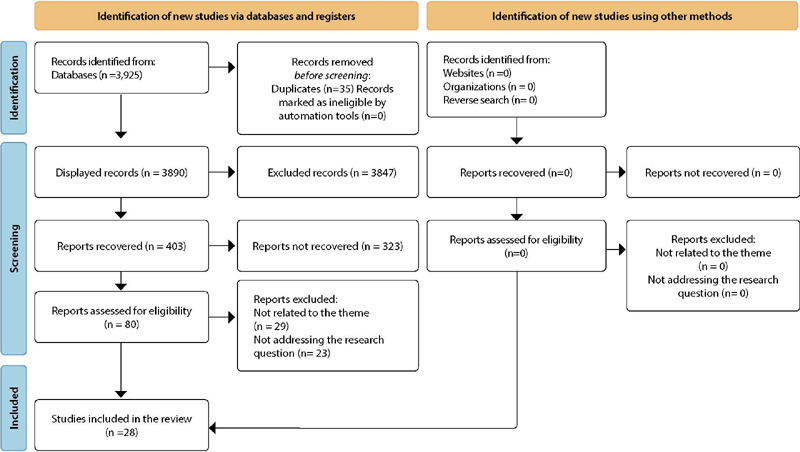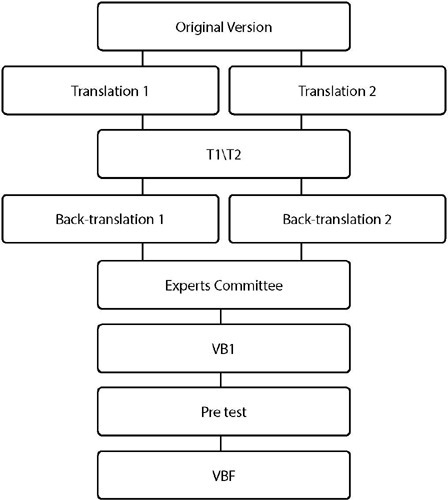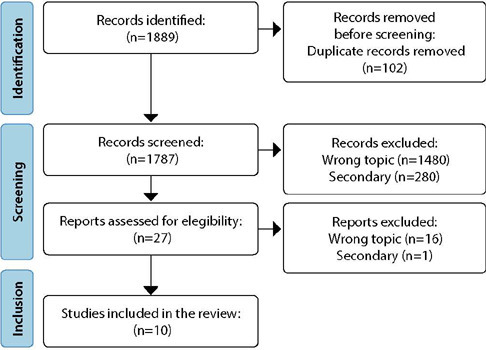-
ORIGINAL ARTICLE06-14-2024
Mid-range theory of the nursing diagnosis Overweight
Revista Brasileira de Enfermagem. 2024;77(2):e20230372
Abstract
ORIGINAL ARTICLEMid-range theory of the nursing diagnosis Overweight
Revista Brasileira de Enfermagem. 2024;77(2):e20230372
DOI 10.1590/0034-7167-2023-0372
Views0See moreABSTRACT
Objective:
To build a mid-range theory for the nursing diagnosis Overweight in adolescents and young adults.
Methods:
A methodological study in the light of the theoretical frameworks of Roy and of Lopes, Silva and Herdman. A total of 3,925 articles were retrieved and assessed using the State of the Art Through Systematic Review software. The final sample consisted of 28 articles.
Results:
The findings converged to 3 essential attributes, 13 antecedents, and 7 consequences. A mid-range theory was built consisting of an illustrated diagram, 11 propositions, and 12 causal relationships.
Final considerations:
From the creation of the theory, it was possible to better understand the nursing diagnosis Overweight within the context of adolescents and young adults. Understanding nursing phenomena contributes to nursing science’s advancement and strengthening.

-
ORIGINAL ARTICLE06-14-2024
The (in)visibility of fibromyalgia through its symptoms and the challenges of its diagnosis and therapy
Revista Brasileira de Enfermagem. 2024;77(2):e20230363
Abstract
ORIGINAL ARTICLEThe (in)visibility of fibromyalgia through its symptoms and the challenges of its diagnosis and therapy
Revista Brasileira de Enfermagem. 2024;77(2):e20230363
DOI 10.1590/0034-7167-2023-0363
Views0See moreABSTRACT
Objective:
To analyze the social representations of fibromyalgia based on its symptoms and their influences on diagnosis and therapy.
Methods:
Qualitative research with the application of the Theory of Social Representations and snowball sampling method. Semi-structured interviews were conducted with 30 adults diagnosed with fibromyalgia in the city of Rio de Janeiro, Brazil, between April 2020 and January 2021. Statistical and lexicographical analysis was performed using Alceste software.
Results:
Pain, as a subjective phenomenon, complicates its legitimacy, diagnosis, and therapy, enhancing suffering. Insufficient information generates judgments, stereotypes, and prejudices.
Final Considerations:
Stigmas, prejudices, the variety and invisibility of symptoms make it difficult to objectify the disease within the Cartesian-biomedical frameworks, generating diagnostic pilgrimage, mistakes, and challenges in treatment. Such representations hinder relationships and the management of the disease. Deconstructing them is a way to better care for those with fibromyalgia. Raising awareness and spreading qualified information are important allies.
-
06-14-2024
Duração e qualidade do sono da equipe de enfermagem brasileira que trabalha em turnos
Revista Brasileira de Enfermagem. 2024;77(2):e20230167
Abstract
Duração e qualidade do sono da equipe de enfermagem brasileira que trabalha em turnos
Revista Brasileira de Enfermagem. 2024;77(2):e20230167
DOI 10.1590/0034-7167-2023-0167
Views1See moreRESUMEN
Objetivo:
analizar la duración y calidad del sueño en profesionales de enfermería que trabajan por turnos.
Método:
investigación analítica, transversal, realizada entre septiembre de 2017 y abril de 2018, en un hospital público del sur de Brasil, con el equipo de enfermería. Se utilizó el cuestionario sociolaboral y de síntomas de salud, la Escala de Somnolencia de Epworth y el Índice de Calidad del Sueño de Pittsburgh. Los datos se presentan como estadística descriptiva e inferencial, análisis bivariado y regresión logística binaria.
Resultados:
participaron 308 profesionales de enfermería, con predominio de sueño prolongado, ausencia de somnolencia y mala calidad del sueño. La duración corta del sueño (<6 h) se asoció con turnos de día y mala calidad del sueño. La calidad del sueño se asoció con la presencia de somnolencia diurna excesiva y con el trabajo diurno.
Conclusión:
los turnos de trabajo, el insomnio y la cefalea fueron los principales factores relacionados con la falta de sueño de los profesionales de enfermería. Los resultados pueden justificar el desarrollo de investigaciones de intervención para la salud de los trabajadores.
-
ERRATUM06-14-2024
ERRATUM
Revista Brasileira de Enfermagem. 2024;77(2):e2024n2e05
Abstract
ERRATUMERRATUM
Revista Brasileira de Enfermagem. 2024;77(2):e2024n2e05
DOI 10.1590/0034-7167.20247702e05
Views2In the article “Educational technologies used to promote self-care for people with diabetes mellitus: integrative review”, with DOI number: , published in Revista Brasileira de Enfermagem, 2023;76(Suppl 4):e20230049, in the title:Where it read:[…]See more -
ERRATUM06-14-2024
ERRATUM
Revista Brasileira de Enfermagem. 2024;77(2):e2024n2e06
Abstract
ERRATUMERRATUM
Revista Brasileira de Enfermagem. 2024;77(2):e2024n2e06
DOI 10.1590/0034-7167.20247702e06
Views2In the article “Is there scientific relevance to the plot of films and documentaries about eating disorders?”, with DOI number: , published in Revista Brasileira de Enfermagem, 2024;77(1):e20220547, page 7:Where it read:[…]See more -
ORIGINAL ARTICLE06-14-2024
Functional performance assessment scale for children and adolescents with cancer: cross-cultural study
Revista Brasileira de Enfermagem. 2024;77(2):e20230331
Abstract
ORIGINAL ARTICLEFunctional performance assessment scale for children and adolescents with cancer: cross-cultural study
Revista Brasileira de Enfermagem. 2024;77(2):e20230331
DOI 10.1590/0034-7167-2023-0331
Views0See moreABSTRACT
Objectives:
to describe the methodological process of cross-cultural adaptation of the PlayPerformance Scale for Children to Brazilian Portuguese.
Methods:
methodological study of translation and cross-cultural adaptation in six stages: translation, synthesis of translations, back-translation, evaluation by a committee of judges, evaluation by expert nurses, and pretest. The agreement and representativeness of the items were assessed using the content validity index. A minimum value of 80% agreement was considered.
Results:
all stages of the translation and cross-cultural adaptation process were satisfactory. In the evaluation performed by the committee of judges, all items obtained agreement above 80%. Fifteen pediatric nurses conducted the content validation, suggesting necessary modifications for understanding and application. Thirty children and adolescents with cancer were assessed with the scale for the pre-test.
Conclusions:
the scale was cross-culturally adapted to Brazilian Portuguese. The need for psychometric testing in a consistent sample is emphasized.
-
ORIGINAL ARTICLE06-14-2024
Translation and Cross-Cultural Adaptation of the LYMPH-ICF Instrument for Lymphedema into Portuguese/Brazil
Revista Brasileira de Enfermagem. 2024;77(2):e20230137
Abstract
ORIGINAL ARTICLETranslation and Cross-Cultural Adaptation of the LYMPH-ICF Instrument for Lymphedema into Portuguese/Brazil
Revista Brasileira de Enfermagem. 2024;77(2):e20230137
DOI 10.1590/0034-7167-2023-0137
Views0See moreABSTRACT
Objective:
The aim of this study is to cross-culturally adapt the Lymphoedema Functioning, Disability and Health Questionnaire Lymphoedema (LYMPH-ICF) instrument into Brazilian Portuguese and conduct a pilot application (n = 10), without psychometric pretensions.
Method:
Methodological research was conducted, following the steps of translation, synthesis, back-translation, and evaluation by the expert committee. Two translators, two back-translators, and twelve professionals participated in the expert committee. A pretest was carried out with 10 patients with secondary lymphedema due to breast cancer. The degree of agreement was determined by the content validity coefficient.
Results:
It was necessary to modify 8 out of the 29 questions comprising the questionnaire, which exhibited idiomatic disagreement. However, despite these changes, there were no indications of impairments, as content reliability was achieved through a validity coefficient of 0.90.
Final Considerations:
The instrument was successfully translated and cross-culturally adapted for Brazil with a high level of agreement.

-
REVIEW06-14-2024
Lean and/or Six Sigma for process optimization in the perioperative period: an integrative review
Revista Brasileira de Enfermagem. 2024;77(2):e20230431
Abstract
REVIEWLean and/or Six Sigma for process optimization in the perioperative period: an integrative review
Revista Brasileira de Enfermagem. 2024;77(2):e20230431
DOI 10.1590/0034-7167-2023-0431
Views0See moreABSTRACT
Objective:
To analyze the evidence on the influence of Lean and/or Six Sigma for process optimization in the perioperative period.
Methods:
Integrative review carried out in the MEDLINE (PubMed), Web of Science, EMBASE, CINAHL, Scopus and LILACS databases on the use of Lean and/or Six Sigma to optimize perioperative processes. The studies included were analyzed in three thematic categories: flow of surgical patients, work process and length of stay.
Results:
The final sample consisted of ten studies, which covered all operative periods. Lean and/or Six Sigma make a significant contribution to optimizing perioperative processes.
Final considerations:
Lean and/or Six Sigma optimize perioperative processes to maximize the achievement of system stability indicators, making it possible to identify potential problems in order to recognize them and propose solutions that can enable the institution of patient-centered care.

-
RESEARCH01-01-2018
Assistance flowchart for pain management in a Neonatal Intensive Care Unit
Revista Brasileira de Enfermagem. 2018;71:1281-1289
Abstract
RESEARCHAssistance flowchart for pain management in a Neonatal Intensive Care Unit
Revista Brasileira de Enfermagem. 2018;71:1281-1289
DOI 10.1590/0034-7167-2017-0265
Views0See moreABSTRACT
Objective:
To describe and discuss the process of developing a flowchart collectively constructed by the health team of a Neonatal Intensive Care Unit for the management of neonatal pain.
Method:
This is a descriptive and an exploratory study with a qualitative approach that used Problem-Based Learning as a theoretical-methodological framework in the process of developing the assistance flowchart for the management of neonatal pain.
Results:
Based on this methodology, there was training in service and the discussion of key points of pain management by the health team, which served as input for the construction of the flowchart.
Final considerations:
The assistance flowchart for pain management, based on scientific evidence, provided means to facilitate the decision-making of the health team regarding the pain of the newborn. It is suggested to use the flowchart frequently to promote the permanent education of the team and identify possible points to be adjusted.

-
RESEARCH01-01-2018
The adolescent and the institutionalization: understanding the phenomenon and meanings attributed to it
Revista Brasileira de Enfermagem. 2018;71:1373-1380
Abstract
RESEARCHThe adolescent and the institutionalization: understanding the phenomenon and meanings attributed to it
Revista Brasileira de Enfermagem. 2018;71:1373-1380
DOI 10.1590/0034-7167-2017-0242
Views1See moreABSTRACT
Objective:
To understand the meaning of being institutionalized and in conflict with the law for the institutionalized adolescent.
Method:
A qualitative, phenomenological-comprehensive study carried out in a Socio-educational Service Foundation in the northern region of Brazil, with 05 institutionalized adolescents. The analysis was carried out under the understanding of the content suggested by Heidgger, thus allowing the construction of analytical categories for a hermeneutical interpretation.
Results:
Conflicting with the law means something negative and bad for the institutionalized adolescents, in which they understand that although there is deprivation of liberty, the period of hospitalization is an important moment for the reflection on the need to start over.
Conclusion:
The meaning of conflicting with the law goes far beyond a simple word, act or behaviour, it is something that only those who experience the phenomenon are able to unveil, arouse deep feelings and provide reflection to the adolescent about the damages caused by the infraction.
-
RESEARCH01-01-2018
Identification of post-cesarean surgical site infection: nursing consultation
Revista Brasileira de Enfermagem. 2018;71:1395-1403
Abstract
RESEARCHIdentification of post-cesarean surgical site infection: nursing consultation
Revista Brasileira de Enfermagem. 2018;71:1395-1403
DOI 10.1590/0034-7167-2017-0325
Views0See moreABSTRACT
Objective:
To describe the profile of women in relation to their living conditions, health status and socio-demographic profile, correlating it with the presence of signs and symptoms suggestive of post-cesarean surgical site infection, identifying information to be considered in the puerperium consultation performed by nurses and proposing a roadmap for the systematization of care.
Method:
Quantitative, exploratory, descriptive, cross-sectional and retrospective review of medical records of women who had cesarean deliveries in 2014, in the city of São Paulo.
Results:
89 medical records were analyzed, 62 of them with incomplete information. In 11, there was at least one of the signs and symptoms suggestive of infection.
Conclusion:
Given the results of the study, the systematization of puerperal consultation is essential. The roadmap is an instrument that can potentially improve the quality of service and the recording of information.
-
RESEARCH01-01-2018
Nursing laboratory and critical education of nurses: approaches and distances
Revista Brasileira de Enfermagem. 2018;71:1500-1506
Abstract
RESEARCHNursing laboratory and critical education of nurses: approaches and distances
Revista Brasileira de Enfermagem. 2018;71:1500-1506
DOI 10.1590/0034-7167-2017-0339
Views1See moreABSTRACT
Objective:
to analyze the contribution of the laboratory of nursing to the critical education of nurses.
Method:
qualitative study, conducted among 18 professors of higher education institutions, being one public and the other private. Data were collected between February and November of 2016 by means of semi-structured interview. To analyze data, it was used a content analysis in the thematic modality.
Results:
it was observed the emphasis in the technical skills development by propagation of behavior and practices; the creation of bonds between professors and students happens on the limit of good interpersonal relationship; the laboratory of nursing may help the critical reflection about the practice, being a place that allows the learning of ethics.
Final considerations:
the nurse education, carried out by the laboratory of nursing, have to overcome the emphasis in the uncritical reproduction of practices and to observe the nurse’s power to think about the reality in the meaning of its modification.
-
RESEARCH01-01-2018
Introduction of the School Health Program in the city of Cascavel, Paraná State: report of nurses
Revista Brasileira de Enfermagem. 2018;71:1540-1547
Abstract
RESEARCHIntroduction of the School Health Program in the city of Cascavel, Paraná State: report of nurses
Revista Brasileira de Enfermagem. 2018;71:1540-1547
DOI 10.1590/0034-7167-2017-0188
Views1See moreABSTRACT
Objective:
to understand the introduction of the School Health Program in the city of Cascavel, Paraná State, as opposed to the report of nurses.
Method:
a qualitative study with fifteen participants. The data were collected from April to August 2015, through semi-structured interviews, analyzed by content analysis and thematic modality.
Results:
the category “Introduction process” of the School Health Program integrates the subcategories “Identified health problems” and the “Challenges of intersectoriality”. The program was implemented quickly, with a fragile training of professionals to perform in the phases that compose it. Structural conditions of schools, human and material resources, and emerging intersectoral interaction were identified obstacles. The integration of the health, school, and family constitutes the program’s potentiality.
Final considerations:
it is understood that the actions of the program were based on health assessments of students, and it is necessary for professionals and managers to discuss and analyze the obstacles identified to achieve all the proposed objectives.
-
RESEARCH01-01-2018
Knowledge about precautions in Primary Health Care: tool validation
Revista Brasileira de Enfermagem. 2018;71:1589-1595
Abstract
RESEARCHKnowledge about precautions in Primary Health Care: tool validation
Revista Brasileira de Enfermagem. 2018;71:1589-1595
DOI 10.1590/0034-7167-2017-0886
Views0See moreABSTRACT
Objective:
To elaborate and validate a tool to assess knowledge and behavior of nursing professionals about standards and specific precautions in the Primary Health Care.
Method:
Methodological study of the elaboration and validation of the tool by thirteen experts judges, using a Likert scale of 4 points, with Content Validity Index ≥ 0.80, on clarity, relevance and pertinence.
Results:
A tool composed of 47 dichotomous questions to assess knowledge and 12 questions, with five options of answers, for the referred behavior. In the validation, only one item was deleted, related to the “Hands Hygiene” axis and one item was reformulated, regarding “Use of Common Gloves” and another 11 changed writing. The tool as a whole was assessed for relevance, comprehensiveness and representativeness within the scope of the topic investigated.
Conclusion:
The developed tool has been validated and is now available for use in Primary Health Care.
-
RESEARCH01-01-2018
Training in diabetes education: meanings attributed by primary care nurses
Revista Brasileira de Enfermagem. 2018;71:1611-1618
Abstract
RESEARCHTraining in diabetes education: meanings attributed by primary care nurses
Revista Brasileira de Enfermagem. 2018;71:1611-1618
DOI 10.1590/0034-7167-2017-0792
Views1See moreABSTRACT
Objective:
seize meanings attributed by primary care nurses to training in diabetes education.
Method:
exploratory and descriptive study, with a qualitative approach, with twenty primary care nurses; semistructured interview script, with interviews processed in the IRaMuTeQ software and analyzed through the Descending Hierarchical Classification. The results were subsidized in the Representational Theory of Meaning.
Results:
nurse training in diabetes education is insufficient for holistic action, although it allows the community to be instrumentalized in specific issues about the disease, using the limited tools available, especially lectures. Nurses find themselves in a context of challenges, improvisations, weaknesses, and limitations that determine the meaning attributed to diabetes education and subsequent actions.
Conclusion:
the meanings attributed by the nurses revealed an incipient training, which limits the quality of care provided and instigates the search for qualification.

-
RESEARCH01-01-2018
Nursing international student mobility in the University of São Paulo
Revista Brasileira de Enfermagem. 2018;71:1619-1625
Abstract
RESEARCHNursing international student mobility in the University of São Paulo
Revista Brasileira de Enfermagem. 2018;71:1619-1625
DOI 10.1590/0034-7167-2017-0754
Views1See moreABSTRACT
Objective:
To characterize the experiences of undergraduate students of the School of Nursing of the University of São Paulo (EEUSP) who participated in international mobility programs between January 2011 and July 2017.
Method:
Exploratory, descriptive study with quantitative approach. Of 68 reports, only 38 (56%) were considered valid and were submitted to descriptive statistical analysis. Data were categorized in general, institutional, academic and cultural aspects and cost of living.
Results:
The main destination was Portugal and the years with most participation were 2012 and 2013. The mean stay was six months and the students took a mean of three to four courses. The main funder was the university of origin.
Conclusion:
Academic activities were limited to theoretical and practical courses, with little insertion in research. There is a need to increase investment in learning other languages and to expand partnerships with larger centers of foreign education and research.
Search
Search in:
Nuvem de Tags
Adolescente (85) Atenção Primária à Saúde (239) COVID-19 (91) Criança (91) Cuidados de Enfermagem (269) Educação em Enfermagem (151) Educação em Saúde (139) Enfermagem (930) Enfermagem Pediátrica (86) Estudantes de Enfermagem (77) Estudos de Validação (131) Família (87) Idoso (208) Promoção da Saúde (99) Qualidade de Vida (104) Saúde do Trabalhador (86) Saúde Mental (145) Saúde Pública (82) Segurança do Paciente (150) Tecnologia Educacional (100)



